Five players in each division who we think are going to make themselves known this season!
December 15, 2019 by Daniel Prentice, Edward Stephens, Hugo Sowder and Charlie Eisenhood in Preview with 0 comments
It’s time to unwrap some presents as we introduce the 12 Days of College Ultimate. Over the next few weeks of December, we will be releasing one gift per day, though don’t count on getting any partridges in pear trees: it’s all college ultimate. From top players to strength bid predictions to highlights, we’ve got a little something for everyone.
Today’s topic: On day five, we’re looking at five players with the potential to become big names in college ultimate this season. Learn ’em now, and look smarter than your friends come April.
Women’s
Lauren Gregorczyk (Texas)
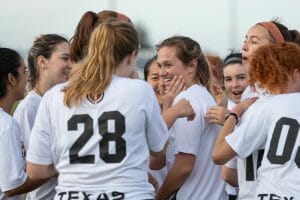
It’s rare that true rookies are able to make an impact at the highest levels of the game anymore. But that’s what Gregorczyk did at Nationals last season. Gregorczyk had never played ultimate before this past season, but her top drawer athleticism made her pop as a freshman for Melee. Gregorczyk wasn’t a vital part of Texas’ systems, and she didn’t put up a particularly notable stat line at Nationals — three goals, 0 assists, four blocks, three turns. But Gregorczyk made a few plays of pure athleticism in Round Rock that teased her potential.
A volleyball player in high school, Gregorczyk built a penchant for explosive layouts very early on in her ultimate career. Her ability to make those high flying plays should only grow as she gets more comfortable with the game. She still has a little way to go as a thrower, but she will still be a true threat downfield as she hones the more technical side of her game. Melee should be a Nationals team once again in 2020, as they already have a strong contingent of proven players. But don’t be surprised if Gregorczyk’s athletic exploits earn headlines and she joins that group as one of the team’s on-field leaders.
Madison Fleming (Ohio State)
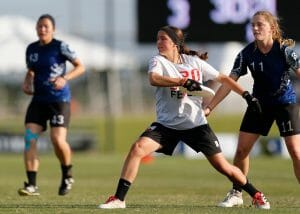
Fleming’s performances last season greatly exceeded her status as a player playing only their second season of ultimate. She was one of Fever’s best depth pieces as a sophomore 2019, showcasing an ability to slot into a number of different positions on the field. At Nationals she looked like a seasoned veteran as she put up three goal, 9 assist, two block stat line.
The third year cutter is the type of player that makes her teammates better. She’s comfortable in a lot of different roles, consistently works hard on the field, and finds a way to be effective without needing a high volume of touches. With that said, expect her number of touches to take a big jump this year. Fever lost a lot of their most high volume players from last season’s roster.
Kyra Khoroujnikova (Utah)
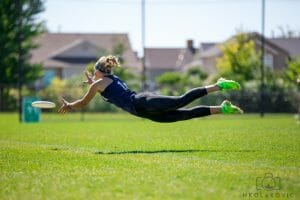
Like many of these players, in-region opponents will be quick to tell you that they recognize Khoroujnikova. The Spiral Jetty leader has been a thorn in the side of regional powers at not only the college, but also club, level. She’s a hard-working playmaker who leads her team. She emerged from the Utah youth scene, and since transferring to Salt Lake City from Utah Valley University, she’s been an important part of Spiral Jetty.
Khoroujnikova is a versatile player, allowing her to function well within lots of offensive and defense contexts. She’s as likely to initiate an offensive possession as a cutter as she is to get a layout block in the deep space as she is to handle in zone offense. That selflessness enhances the impact of her leadership and boosts the production of her teammates. Utah could be a team to watch in a deep Northwest region, with Khoroujnikova potentially getting the biggest stage of her career thus far.
Katharine Suarez (Georgia)
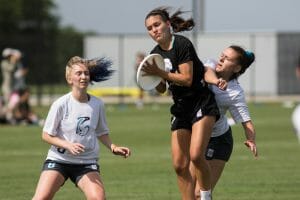
Katharine Suarez transferred to Georgia as a totally unheralded sophomore last spring after playing her freshman season with New Mexico. The junior captain does not dominate the game from behind the disc like her more well-known teammates Josie Veal and Marie Perivier; she doesn’t have to. On offense, she’ll likely inherit the role vacated by Alex Fairley, opening up spaces downfield for her teammates and whizzing, comet-like, for the end zone when she sees the various moving parts align in her favor.1
But Suarez truly shines on defense. Speedy, nimble, relentless, and armed with a quick bid-trigger, she’s going to be giving opposing cutters fits in 2020. Athena’s offense will be good enough to put up goals consistently against any team in the country this spring, but if they are advancing deep into tournaments and notching wins against top-tier teams, it will be because of Suarez’s exemplary play on the D-line.
Elsa Winslow (UC Santa Barbara)
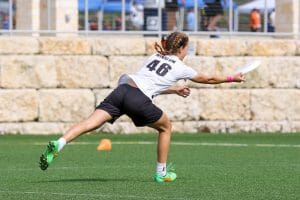
There will be a sizable vacuum of touches to fill for the Burning Skirts after the departures of All-Americans Julia Kwasnick and Audrey Brown. Winslow, now a sophomore, really began to hit her stride in the series last season and should be one of the players to help fill those key, playmaking roles.
Winslow was a tireless runner last season, and she played an important role in the offense, even if it wasn’t always an obviously noticeable one. She also quietly had eight goals at Nationals, good for the sixth highest tally on the quarterfinalists’ roster. Winslow seems to have further upped her game during the recent club season. She should be one of UCSB’s top downfield playmakers as the team reloads after their strong 2019.
Others to Watch
- Lauren Hanna (UC San Diego)
- Athena Lynch (UCLA)
- Beth Manturuk (Pittsburgh)
- Kaitlynne Roling (Wisconsin)
- Jordan Bricknell (Tufts)
Men’s
Lukas Ambrose (Oregon)
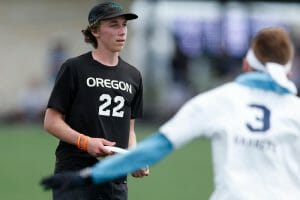
Trivia question: Who led the men’s division in blocks at College Nationals in 2019? Don’t overthink it — just look at the header. Then-sophomore Lukas Ambrose’s 11 block total over just five games in Texas was the silver lining to Oregon Ego’s otherwise disappointing early exit from the tournament. Compare that to the three teams who played seven games (Brown, UNC, and Colorado): no player in that group — or, for that matter, anywhere else on the men’s side of the tournament — managed to hit double digits.2
Even more impressive than the number of times Ambrose broke up passes is how he did it: not, as you might expect given the well-documented gusty conditions in Round Rock last year, by playing wing or deep in a zone and waiting for the inevitable punts to come his way, but by bidding over and over again on unders in honest matchup sets. Ego’s across-the-board flatline speed is a known quantity that will continue to cause problems for opponents, but having a player like Ambrose with the ability and awareness to explode into a play at the right moment is another thing entirely.
Taylor Barton (BYU)
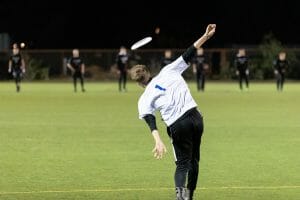
So you’ve heard of Jordan Kerr. But, be honest: how many other BYU players do you know? This year, it’s time to get acquainted with junior Taylor Barton. The rangy defender has already made it onto the radar with some eye-popping individual efforts, like this impressive recovery for a layout block and this huge sky at CCC last month. Clearly, he’s got big play ability, but he’s also a steady shut down defender and often more likely to be throwing the assist for the break than jumping over someone.
An alumnus of the high school powerhouse Lone Peak, Barton was First Team All-State in Utah in 2015 alongside BYU star teammates Kerr and Braden Eberhard. Like many D-line grinders, it may be harder for him to get noticed as easily, but his full toolkit should come into wide view in 2020. It’s hard to miss the massive layout blocks, especially if it continues to be a part of BYU victories over top 10 teams.
John Roorbach (Georgia)
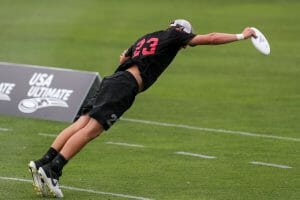
There are a lot of small ways to contribute on an ultimate field, and some of the best players the division manage to synthesize many of them into a brilliant package. That’s the Matt Gouchoe-Hanas type — and it isn’t anything like John Roorbach, at least not yet. Roorbach belongs to the other class of star, the players who are so very good at one particular thing that it obscures everything else they bring to the table. Roorbach’s superpower? Put simply, the guy jumps like he’s being shot out of a cannon.
Georgia Jojah have been a bit of a ‘What if…’ offensive team for a couple of seasons now. Too often, that becomes ‘What the…’ and they have that same question mark hanging over them heading into 2020. If they have trouble getting their act together in the spring, it won’t matter much how good Roorbach can be downfield. But if Jojah can find ways to consistently create and take advantage of big spaces, they will have one of the premier receivers on hand to chase down hucks and win matchups against the division’s Tannor Johnsons and Michael Ings.
Adam Stautberg (Michigan)

Michigan was one of the surprises of the 2019 season, and they look poised to be build on that this spring. Adam Stautberg will be a major contributor to their efforts, as a critical leader that brings energy, effort, and commitment to the club. He’s relentless on defense, but still an attentive and thoughtful defender that can play help in matchup and diligently in zone sets. His energy and enthusiasm are important intangible weapons for the second-year captain.
But his contributions do extend to the stat sheet. He was tied for second on the team in goals at Nationals with eight, a number that could expand with his central deep cutting role. However, as he works to improve his throws, he may end up doing more facilitating, turning some those potential goals into assists. Stautberg offers a variety of benefits to Magnum and will be a central figure in their season.
Ethan Ylizarde (UNC Wilmington)
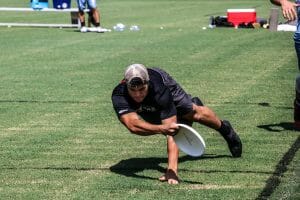
Wilmington lives and dies by their deep game. It’s something the deep has never been able to shake, even in seasons when they’ve had a balanced O-line. Ylizarde got a lot of good reps throughout the year and crafted a deeper playstyle outside of simply being able to bomb forehands in 2019. His footwork and cadence with the rest of Wilmington’s offense helped deliver a promising preseason result at CCC and rocketed Ylizarde’s stock up drastically as he worked with Connor Russell to power Wilmington’s offense to the final.
On the surface Ylizarde can seem like the prototypical Wilmington handler: aggressive, reckless with the disc, and undisciplined. But there’s more going on with Ylizarde’s game then muscling the disc around the field and his ability to push himself outside of the box of a pure deep thrower has made Ylizarde an exciting story on top of UNCW’s climb into the preseason conversation.
Others to Watch
- Cole Feltman (UNC Wilmington)
- Tyler French (Georgia Tech)
- Caleb Seamon (Tufts)
- Conor Tabor (Colorado)
- Jake Thorne (Cal Poly SLO)